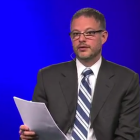
Regular JJIE contributor Judge Steve Teske was recently featured in The Washington Post for his crusade to end the school-to-prison-pipeline. The Post examines how Teske’s work to reduce schools’ referrals to juvenile court has gained a national audience.
Teske says zero tolerance policies have resulted in too many kids entering the juvenile justice system. In Teske’s opinion, “zero tolerance often means overpunishment for low-level misdeeds,” according to The Post. Because of that, he helped bring reforms to his home community of Clayton County, Ga., where Teske is chief juvenile judge. Since implementing the changes, juvenile crime has dropped, recidivism is down and graduation rates are up.
Teske, the story says, remains tough on crimes involving guns and drugs.
“The cases we have in court now are the burglars, the robbers — the kids who scare you, not the kids who make you mad,” Teske told The Post.
As Teske travels the country speaking about the need for reform, the success of Clayton County, The Post notes, is now inspiring communities in Connecticut, Indiana and Kansas, among others, to implement similar reforms.
And Teske is quick to point out his own teenage lapse in judgment, a school prank that today would have landed him in juvenile court. At 13, he pulled his school's fire alarm but his principal insisted the school handle Teske's punishment.
“Would I even be a judge today had I gone to jail that day?” he asked in The Post.





